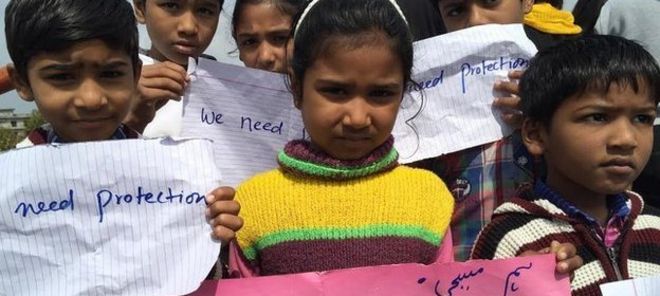Shagufta Kausar and her husband Shafqat Emmanuel have spent the last six years in jail waiting for an appeal against their death sentence for "blasphemy" to conclude.
Now, the family of the poor Christian couple from the central Pakistani town of Gojra hope an end to their ordeal could be in sight, with a final hearing at Lahore High Court scheduled for Wednesday.
Their lawyer, Saif ul Malook, who also represented Asia Bibi, another Christian woman who had a death sentence for blasphemy successfully overturned, told the BBC the evidence used to convict the couple was deeply flawed.
But, he warned, that judges can be "fearful" of acquitting suspects, in case they are targeted themselves by extremists. Court proceedings have also slowed in recent weeks as a result of the coronavirus outbreak.
The married couple were convicted in 2014 of sending blasphemous text messages insulting the Prophet Muhammad to a local imam from a phone number registered to Shagufta Kausar's name. Blasphemy is punishable by death in Pakistan, and though no-one has ever been executed for it, dozens have been killed by mobs after being accused of the crime.
Shagufta's brother Joseph, who requested his surname not be published, told the BBC the couple were innocent, and he doubted they were literate enough even to have written the abusive messages. Shagufta worked as a caretaker in a Christian school, whilst her husband Shafqat is partially paralysed.
Joseph said on a visit to jail, Shafqat told him he had been tortured into making a false confession: "He told me the policeman hit [him] so hard that his leg was broken."
The couple have four children, who Joseph said had been left traumatised.
"All the time they are crying… they are missing them, they wish to see their parents again."
Human rights groups say blasphemy allegations are frequently used to settle personal scores or target religious minorities. The couple's lawyer told the BBC that in their trial they suggested a Christian neighbour they had argued with might have purchased a SIM card in Shagufta Kausar's name and sent the messages in order to frame them.
Blasphemy convictions are often eventually overturned on appeal in Pakistan. Last year, Asia Bibi left the country after more than a decade in prison, having been acquitted by the Supreme Court. The verdict led to violent protests by hardline religious groups.
Lawyer Saif ul Malook told the BBC he believed the case against Shagufta Kausar and her husband was even weaker than that against Asia Bibi.
He said the couple deserved similar support from the international community, and if acquitted, they would also need to be granted asylum abroad. Joseph told the BBC the family's hopes for justice had been boosted by seeing Asia Bibi's release.
The Supreme Court judges who acquitted Asia Bibi warned of the danger of false blasphemy allegations - however, new cases continue to be filed in the country. In April, a woman from the Ahmadi sect, considered heretical in Pakistan, was charged with insulting the Prophet Muhammad during an argument after she attempted to make a donation to a local mosque.
Who are Pakistan's Christians?

- Make up 1.6% of Pakistan's predominantly Muslim population
- Majority are descendents of those who converted from Hinduism under the British Raj
- Most converted to escape their low-caste status and many are among the poorest in Pakistan
- Targeting of Christians fuelled by strong anti-blasphemy laws and anger over US-led war in Afghanistan
- https://www.bbc.com/news/world-asia-52889974
No comments:
Post a Comment